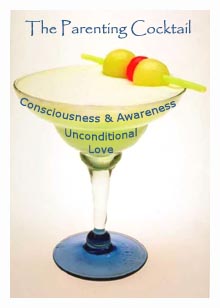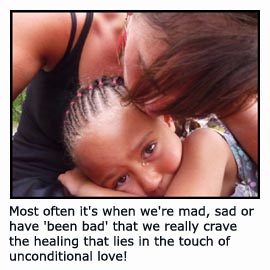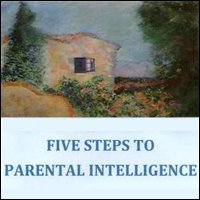What Makes a Good Parent? Discover the Power of Conscious Parenting
A Strong Cocktail of Consciousness and Love: Knowing What You Want for Your Kids and Being Those Qualities Yourself!

• We all want to be good parents!
• So, what makes a good parent?
• Well, one really important ingredient in the cocktail of what makes a good parent is being able to zoom in on the 'larger perspective' and being conscious of what kind of basic life skills we would like our kids to have!
• In other words, which kind of basic life skills would we like our kids to be enriched with as adults!
• In this parenting article you will:
• Read about which kind of basic life skills I want for my son, why, and how I will help him get them!
• See what kind of 'qualities' I wouldn't want for my son and why!
• Get to do a parenting worksheet exercise where you decide which basic life skills you would like for your child!
So What Makes a Good Parent?
... or Is That Really the Question You're Looking for?
Actually, rather than asking the question: What makes a good parent? Or what are good parenting skills? - I would like to expand this good parenting question and make you focus on the result - which I bet is what you're really interested in - namely:
• How do I pave the road for my child to have a happy, deep and meaningful life?
• What powerful personal and social qualities would I like my child to have and enrich his or her life with?
You see, by taking a long term perspective as to what we want for our children - the question of what makes a good parent will more or less answer itself.
It really will!
Just read on, and I'll show you!
My 'Wish' List of Life Skills for My Son
- My Example of a Parenting Worksheet Exercise!
During the next couple of sections I will present you with some personal qualities - you could call them basic life skills - that I would really love for my kid to have.
This is just my list - it's not at all extensive (not for me and probably not for you) but in my view it does contain some of the most important life skills!
If you feel like it, you can make your own parenting worksheet. I can really recommend it!
The way that I've done it is that I've made a list of all the qualities I would like my kid to have.
Then I've sort of turned it around on myself and tried to see how I could become that quality myself that I would like my child to have (qualities such as respect, unconditional love, being caring, being patient, understanding and so on and so forth).
The point is teaching by example! Setting an example ourselves as parents is much, much more powerful than traditional teachings via do's and don'ts!
My personal experience is absolutely crystal clear on this point.
You'll see more of what I mean in concrete terms further down.
For now let's proceed with my list.
Afterwards I will come up with some suggestions as to how you can make a parenting worksheet for yourself and your child.
1) I Want My Child to Feel that He Is Unconditionally Loved and AcceptedHow?
By Loving My Son for Who He Is, Not for What He Does!
"Hmmm, is this a life skill?", you may ask?
By Loving My Son for Who He Is, Not for What He Does!
Oh yes, I really think it is!
Why?
Because knowing that you're unconditionally loved makes you incredibly powerful, installs a basic optimistic trust in people and the world, sets you free and fuels your self esteem.
Not bad, hey?
However, most people don't feel they're unconditionally loved and accepted for who they are.
If they did, they probably wouldn't be stressing and working so hard as adults to try to 'earn' other people's admiration and acceptance.
They wouldn't be unconsciously driven to constantly seek other people's approval via hard earned accomplishments and successes!
They probably wouldn't care so much about what other people think because they would know that they are loved for who they are, not for what they do!
Thinking that love is something you earn by 'being good' and living up to expectations is an incredibly hard life because you'll be constantly "working hard" only to catch what is a shallow shadow of love. It is very unrewarding in the long run!
So, I would love for my son to:
• Know that he is unconditionally loved and accepted for who he is, not for what he does. I don't want him to think that he has to 'earn' my love!
How can we parents teach the life skill of feeling and giving unconditional love and acceptance?
By being an example ourselves and giving it ... no strings attached!
You see: if we were to send out a questionnaire asking parents:
Do you feel you love your kids unconditionally?
Most parents wouldn't hesitate a second to cross out the box: YES!
Okay, now moving on to a more challenging question in the questionnaire:
Do you always show your kid that you love him or her unconditionally (meaning no matter how your kid behaves?)
Uh-oh! The result of the test is often: Yes, I feel I love my kids unconditionally, but perhaps I don't always show it!
This isn't so strange because "conditional love" is typically what we've been taught by our parents and by the 'achiever', success orientated values of our society.
Conditional parenting means showing more positive affection toward your child when he or she behaves in ways you approve of.
In some ways - and I'm probably being quite provocative now - conditional parenting is a mild form of behavior control which makes kids more prone to obedience, yes, but in the long run installs the mindset that "if they just behave and follow the rules they will be loved!"
Many parents would think, "This is great! Obedient children, wow, just what I want!"
But is it really what they want?
Right now, yes, probably, it seems to make parenting easier! But in the long run, no, I don't think that's what they really want!
Because the other side of the coin is: If their kids screw up, throw tantrums, lie, disobey and break rules, they will be punished in the sense of not getting affection ... right at the moment when they probably need it the most!

Because isn't it when we're unhappy, sad, stressed or angry that we really need to feel the affection of unconditional love?
I think so!
I would really love for my son to know and feel the basic existential security that lies in knowing that no matter how he behaves, I will never withdraw my love.
Therefore my personal strategy is not to use withdrawal of love as a means to control his behavior.
It's not always easy in practice, sure, but striving towards no punishing, no scolding, no spanking, no ignoring, no holding back affection as punishment, no threats AND no bribes - really does makes parenting a lot simpler and much, much more pleasurable ... at least it has to me!
If you're interested in reading more about this view point, you're welcome to go and read these parenting articles about the power of the unconditional positive regard and what is called unconditional parenting.
2) I Want to Teach Him to Trust His Intuition and Gut FeelingHow?
By Cultivating His Free Will to Make Optimal Choices
and Taking Responsibility for His Own Life!
This is another tough one because traditional child discipline practices has more or less brainwashed us to think that nice, obedient children is what we want.
By Cultivating His Free Will to Make Optimal Choices
and Taking Responsibility for His Own Life!
However, the consequences of strict child discipline are often that these kids haven't had chance to know what on earth their gut feeling is because every time it popped up its little head, it was overruled. Some silly rule or rigid tradition smacked it right down again!
So these kids have learnt nothing about making choices for themselves because all choices were made for them!
I've seen many people who have been raised with strict child discipline and what is common there is a tendency to have a somewhat apathetic mindset that says:
"I don't choose my life, circumstances do. I just follow along. I don't really know what I want. I can't feel it. It's much easier to let other people decide for me! They probably know better!"
Many people who have experienced strict child discipline have never been trained in listening to their gut or intuition and asking themselves: "Is this right for me? Is this really what I want?"
They've just been trained in following the rules because that was what was expected and made them feel approved of! They were rewarded with affection and attention when they lived up to their parents' terms and standards.
So, how can we parents teach our kids the life skills of using free will to make optimal choices?
Well, if we want our kids to take responsibility for their own lives and choose what is truly in their best interest (as distinct from other people's expectations) - we've got to allow our kids to take responsibility and allow our kids to make choices!
It's logical - it's almost like a basic math equation, right?
Of course a young child can't have full responsibly of his or her life or choose everything he or she wants. A child lacks the very thing you as a parent have: Perspective - an ability to see the consequences over the long haul.
However, we can teach them to navigate among possibilities successfully by providing them with a framework in which there is plenty of room for choice.
You can read more about this strategy of providing space of choice within your framework in this positive parenting article.
3) I Want Him to Enjoy Being Naturally Intimate and Love Closeness
How?
By Being Deeply Present and Fulfilling His Basic Needs!
I would so love for my son to find it natural to enjoy close intimacy with other people and not be afraid to open up and be honest.
How can we parents teach the life skill of intimacy, being deeply present and paying attention?
By Being Deeply Present and Fulfilling His Basic Needs!
By doing it a lot ourselves!
Right from the minute my son was born, he just craved intimacy. He wanted my full attention, my touch, my eye contact ... all the time. And honestly, it was exhausting because I could never put him down.
However, I did make a conscious deal with myself back then (a deal which I still uphold today) which went something along the lines of:
I am never too busy to give my child affection e.g. a hug! Even if it means (and it does) pulling my bicycle (in Copenhagen almost everybody travels by bike) off to the sidewalk in the middle of the rush-hour, getting off and giving my kid a hug.
However, this intense, powerful social need of his is today also a charming and valuable part of his personality.
He's very good at paying attention, focusing on me or what he's doing, reaching out for hugs and kisses when he feels he needs it.
He knows this need will be met, so he doesn't hesitate to reach out for it!
4) I Want Him to Be Playful, Happy and Really Enjoying the NOWHow?
By Showing Empathy, Respect
and a Whole Damn Lot of Patience

By Showing Empathy, Respect
and a Whole Damn Lot of Patience
For some reason we're so busy today.
Without really being aware of it most us (me too) walk around with a constant restlessness, an inner loudly ticking clock that propels us to want to be one step ahead all the time - to not thoroughly engage in the moment!
This results in phrases like "come on, we've been here long enough now", "let's get going", "we need to do this NOW" - often when there's no real reason for it. It's really odd.
I so often catch myself FEELING busy when I'm actually not really busy. Feeling busy is like a sticky software virus that tries to govern my actions.
So I often consciously have to "pull the hand break" and say "stop" to myself and ask "Am I really that busy right now?"
When we're so busy, we tend to:
- Be less respectful towards our kids in the sense of forcing instant obedience into them via harsh words simply because it's easier and faster! We just can't be bothered to show respect because it takes way too long and we need compliance NOW!
- Show less empathy, involvement and patience with our kids' ideas and projects. We celebrate our children's ability to concentrate and being focused in a game (when we want some time off to ourselves) but when we need to get going, it's an entirely different matter.
I would really love for my son NOT to inherit this annoying "I'm so busy all the time". I personally hate it!
How can we parents teach the life skill of respect, empathy and patience?
Of course there are many ways but if we stay within this topic of being busy, it's about trying not to transmit our "busy-feeling" to our children.
By showering ourselves with golden patience and respect and taking a look at the bigger perspective and asking ourselves "Am I really that busy?" - And if "Yes", "Is it worth it?"
Most often the answer will be no. Well, it is to me!
These were a few of my thoughts of what makes a good parent:
Being conscious of what life skills you'd like to pass on (and which you don't) and be those qualities yourself that you would like give your child.
Now it's your turn to consider what makes a good parent and what basic life skills you want for your kid!
Your Own Parenting Worksheet
of Basic Life Skills for Your Child
First I will present you with a non-extensive list of basic life skills for children (or people in general) that may help you:- Kick off your own process of finding out what you want for your child!
You can pick and choose whatever you want, make up new ones - these are just suggestions:
Feel, know and give unconditional love - feel basic trust - feel secure - reach out for help - take responsibility for his / her own life - be a caring person - respect himself / herself and others - love intimacy - have a free will - make choices based on real interest - know and trust his / her gut and intuition - have a strong will - be focused and dedicated - have positive expectations - be honest and open - be forgiving - be conscious and have a high awareness - be reliable - be who he or she naturally is - be explorative - be spontaneous - be an adventurer - be understanding ...
Now we're ready for your own personal parenting worksheet of what makes a good parent!
Here's what you do:
You take a piece of paper and you write:
|
Writing a Letter from Your Child to You, the Parent

Another great way to think about which basic life skills you'd like to help your child achieve is to create a fictional letter from your child to you.
In this letter you write on behalf of your child about all the basic needs you wish to have fulfilled via you, the parent.
Such a letter from a child to its parents might not only be quite fun to make but also make out really creative, deep and highly spiritual self help advice for parents.
Basically this letter is a wish list from your child to you.
I hope you enjoyed this parenting article about what makes a good parent and what I think are some good parenting skills. I really hope it was of use to you and that it put things in perspective.
Your Positive Parenting Ally,
Birgitte

Want to stay in touch and get the latest news?
Sign up
for my free newsletter
Parent Coaching
- For Inner Peace, Clarity and a Deeper Connection to Your Child
 Being a parent can feel like a double-edged sword. Life with kids may feel like the greatest gift you have ever received, while at the same being hugely challenging, often leaving you confused, stressed and overwhelmed.
Being a parent can feel like a double-edged sword. Life with kids may feel like the greatest gift you have ever received, while at the same being hugely challenging, often leaving you confused, stressed and overwhelmed.
When we feel like this, we've lost touch with ourselves. We can't hear our own inner voice, and it's difficult to know what is 'right' for us and how to act.
I offer in-depth parent coaching to help you regain your balance and get back in touch with yourself. From a place of inner peace and clarity, your will find your own answers which will help you reconnect with your child from a place of unconditional love and acceptance.
Read more about my parent coaching here.
Where Would You Like to Go Next?
 Good Parenting Skills For the Conscious, Open-minded Parent! |
 Effective Parenting Skills Nothing Kills a Tantrum Better than Unconditional Love! |
 Healthy Parenting Insights: Reduce Potential Child Health Problems with a Physiologically Healthy Lifestyle. |
 Learn to Use Parental Intelligence in 5 Simple Steps: Expert guest post by Laurie Hollman Ph.D. - solving bad behavior in children with a conscious self-reflective mindset. |
 Perfect Parenting: My Less-than-Perfect Parenting Oops'es! |
Back to the top of this page about What Makes a Good Parent? Discover the Power of Conscious Parenting
Go to the Positive Parenting Ally Homepage







